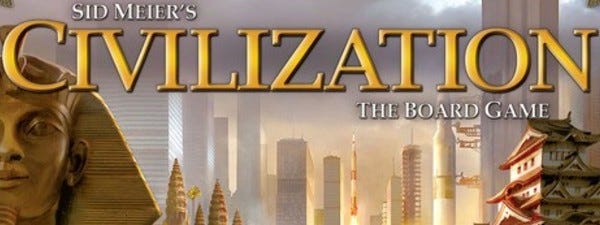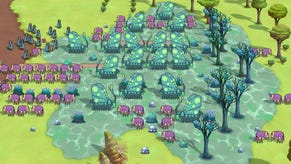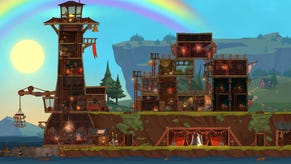Cardboard Children: Sid Meier's Civilization
Hello youse.
Sid Meier's Civilization. Oh yeah. Now I've got your attention. Speaking to a PC gaming audience about Sid Meier's Civilization is like speaking to an audience of teenage boys about Sasha Grey. There's an instant connection. Recognition. A smile. A remembrance of all-night sessions. Of good times, fun, frustration, disgust, guilt. And of desire.
In case you wandered onto this website while looking for that other RPS site (Robert Pattinson Sextape dot com), Civilization is a PC game that lets you grow a civilisation from its roots, developing it until you reach the modern era. You learn new technologies, create cities, construct amazing buildings and erect wonders that speak forever of your greatness. You play it all night long. You get big purple bags under your eyes. You realise it's six in the morning. You put on weight. You don't listen to people when they talk to you. You smell. You need to get a grip of things, son. Get out and meet people. I'm worried about you. If you need to talk, I'm here. You got that? I'm here. That's Civilization. 96%
I've never met anyone who doesn't like Civ. It's one of those games. You buy a PC, you play Civilization. It's a holy thing. And this is the board game of that holy thing. So, yeah. It better be holy too, right? No pressure.
Sid Meier's Civilization: The Board Game is the FIRST and ONLY thing that should be on your Christmas list this year. Yes, I'm talking to you. You, PC gamer and constant reader of RPS, should be asking Santa for this board game NOW. You don't have to read any further. You only have to trust me. Get out there today, to a Santa's Grotto, sit on an old man's knee and scream “CIVILIZATION!” into his face. Scream it until every child in the queue weeps with terror and a shopping centre security guard instinctively reaches for a gun he doesn't even have. Because this is the game for you. This is the board game that every PC gamer needs. This was made for you.
I'll be referring to the game as SMC:TBG(FIG) from now on, to save space. It means Sid Meier's Civilization: The Board Game (Fuck It's Great!). And I'm going to tell you about how it plays, and then you're going to want it. A knock-on effect will probably be that reading about the board game gets you in the mood for the PC game, and you start installing that too. Basically, I'm going to control your mind for the rest of the day. Sit back and enjoy.
Before I start raving about this game, watch this.
SMC:TBG(FIG) is a game for 2-4 players. You can expect a 4-player game to hit a five hour play time, if you're taking your time and negotiating/trash-talking. At the start of the game, you choose from six playable civilisations – the Egyptians, the Russians, the Romans, the Americans, the Chinese and the Germans. You lay down your capital city, and place your starting armies and your little scout. From that humble beginning you will expand your power until someone has to leave the room to calm down a bit.
The world itself is randomly generated, and as you saw in the video above, there's a “Fog of War” effect that means you need to discover what's out there. I'm going to do something now that I've never done before in any of these columns. I'm going to lay out exactly how a turn plays. Each of these phases are carried out by each player in turn.
1.START OF TURN: At the start of the turn, the first player token is passed. And then the player can perform any Start of Turn actions enabled by Technologies or Culture Cards. The player can also do one of these beautiful things.
• Build a New City: A player can convert one of their scouts into a new city. The Romans can use an army to build a new city, because they're Roman, and they're like that. You can only build two cities until you research Irrigation. Which is very Irrigating. Irritating.
• Change Government: If you researched a new system of government in the previous turn, you can change shit up. Maybe you want to switch to a Democracy. Maybe you want to usher in some lovely Communism. Each government has different benefits. If you didn't research the new system of government in the previous turn, you can only change governments by first sending your government into Anarchy, and then in the following turn switching from Anarchy to one of your known governments. Anarchy. In a board game. Amazing.
2.TRADE: In this phase, each player gains trade points equal to the number of trade icons printed in the outskirts of their cities. Almost every square on the game's map has icons of some kind printed on it. And buildings also have icons printed on them. After you tally up your trade, you can negotiate with other players. Trade points and resources and promises and lots of other groovy things can be swapped with your allies, or extorted from them through the threat of terrible harm. All promises are non-binding. Amazing.
3.CITY MANAGEMENT: Each player then performs City Management, and one action can be taken for each city in the player's control. You can do one of these three things -
• Produce a Figure, Unit, Building or Wonder: By adding up the little hammer icons in your city's outskirts, you can work out how many production points that city has. Then you can pay the cost to put a figure on the board (a figure is either an army or a scout), a unit into your standing army (a unit is a card that goes into your battle deck – the army figures merely represent your army, the unit cards are what you actually battle with), a building into your outskirts (buildings generally have more icons printed on them, and generate more trade, production or culture points), or a wonder into your outskirts (wonders have a high production cost, but give your civilisation special effects and look SUPERCOOL).
• Devote to the Arts: You do this to generate culture points from your city. Culture points allow you to move your civilisation along the Culture Track, which rewards you with Cultural Event cards and Great Persons. Great Persons can be placed into your city outskirts and give bonuses to your civilisation. You can also win the game by reaching the end of the Culture track. And you can say to the other players “You people are so uncultured!” before sitting wondering if “uncultured” is actually a word.
• Harvest Resources: If you choose to have your city harvest resources, you can produce one resource from any that are printed on your city's outskirts. So, if there's some silk printed on one of the squares surrounding your city, you can take one silk resource token. These resources are VITAL. They activate special abilities on Tech Cards, and can be a huge advantage in any negotiations with other players. “I won't punch you if you give me a Silk.”
4.MOVEMENT: Each player then gets to move each one of their figures. Players start with a movement speed of 2, but this can be increased by researching new Tech, from Horseback Riding all the way up to the 6 square movement horror of Flight. When figures are moved adjacent to an unexplored tile, that tile can be flipped for one movement point, to show what the unexplored land contains. Huts and villages can be found on newly explored tiles, and these can be attacked by armies. Huts get “peacefully absorbed” by your empire, and a resource is your reward. Villages defend themselves, and you need to fight some uncivilised Barbarian types to claim the resources held within. If your army moves into a space with an enemy figure, combat begins and swearing fills the air. If your army moves into an enemy city, an attack begins, and the language gets even worse. Oh, and if you move your scout into a square in an enemy city's outskirts, you stop that square from generating anything for that city, and can actually use it to generate lovely stuff for you! That's called a blockade, and it really pisses people off.
5.RESEARCH: Each player then chooses one Technology to research. It costs trade points to research a Tech card. And this brings us to the Tech Pyramid. Here's what I like to call “A Beautiful Bit Of Game Design”. To research Level II technologies, you need to build the foundation first. You need to know two Level I techs before you can build a Level II on top. And to build a Level III, you need to place it above two Level II cards. Which means you need at least three Level I cards down below. To achieve a Tech Victory, you need to research Space Flight, which is a Level V tech. That means you need a bottom row of five Level I cards, a second row of four Level II cards, a third row of three Level III cards, a fourth of two Level IV cards and a V on top. A pyramid. Always a pyramid. There are a lot of techs to choose from, so the decision-making is delicious. A real fist-biter. Tech cards allow you to build new buildings, level up your army units, learn about new methods of government, and activate special abilities that are often powered by resources. When you research a tech, you always lose ALL of your trade points. So, if you have 13 trade points and you research a Level I tech (with a cost of 6 trade), you lose all 13. However, if you 've powered up your economy, you don't lose every point of trade after you research. If your economy level is 5, for example, you would always have 5 trade points left after research. (This is why an economic victory and a Tech victory work well in parallel.) I hope I'm not confusing you all here.
So, yeah, that's the game. There are four ways to win. You can grab your tech victory, by researching Space Flight. You can grab a military victory, by destroying one opponent's capital city. You can get a cultural victory by advancing along the Culture Track to its end. And you can pull off an economic victory by generating lots of coin.
I wanted to explain the rules of the game (and I know it's always a very dry read) purely because I feel that this game is brilliant from the rules up. When I read the rulebook for the first time (and it's a great rulebook, much better than the usual efforts from Fantasy Flight) I couldn't wait to play. The rules are so simple, and so clean, but they suggest so much depth. Kevin Wilson is the game's designer, and he's the guy who brought us Arkham Horror. But where Arkham Horror is wide, Civilization is deep. Arkham is complex, with a million mechanics clunking and grinding against each other, sending you stumbling over the surface of it all as you try to cope. Civilization is tight, and easy to learn, but you can burrow right down inside it, finding new routes everywhere you turn.
A 4 player game of Civilization is a beautiful thing. A civilisation at each corner, playing it cagey, with armies starting to poke their way out into the unknown. Every army advance is a step closer to enemy territory, and it's through these movement phases that alliances start to suggest themselves. In my most recent game, I allowed the Germans to enter the Roman quadrant of the board as long as they promised not to leave the forest they were generating production from. A four square patch of forest, with scouts hacking away at the wood, and I had to watch them like a hawk. I knew that the Germans were building a powerful military, so I felt that giving them a patch of my land to ease their production issues would keep them off my back for a while. It was an alliance I had to make, because I was done for if they advanced. I was pushing for a Cultural Victory, so my cities were learning-heavy and military-poor. My “take my trees” strategy bought me a little bit more time.
Each civilisation has its own advantages. The Romans, for example, can advance along the Culture Track each time they build a wonder or a city. The Russians start with an extra army figure. The game is so beautifully balanced despite all the civilisation variety and the multiple win conditions. Never, at any point during Civilization, will you say “This isn't fair.” It's been polished and playtested until it plays like a dream.
One of the most amazing things about Civilization is that it is an epic-scale game with very little downtime. The game plays quickly, with the one-action-per-city limit ensuring that no player is umming and aahing over a decision for too long. The turns fire round so swiftly that if you take a break to go to the toilet, you'll probably be holding things up for a minute or two. By removing much of the micromanagement of the PC game, and zooming out a little to a wider view, the game manages to provide the civ-building joy without any admin headaches. It's taken the fun aspects of Civilization and made them the focus of the board game.
Board games are only ever as good as the memorable moments they provide. And Civilization provides them by the bucket load. It's the kind of game that gets you saying “Remember that time when...” Believe me – this game will create classic board game memories for you.
Here's my classic moment.
My Romans were minding their own business, advancing as a culture, and being very peaceful and noble. Good guys. And the Germans, inevitably, moved out of that forest I had given them, and started in on my cities. I was doomed. In fact, everyone was doomed. When my capital city fell, and it would, the Germans would win. At the end of that turn, I had enough trade to research a Level IV tech card. I saw that Atomic Theory was in there, a card that allows you to nuke a city, if you have uranium. I had no uranium. But I had a plan. I researched Atomic Theory, and the Germans looked baffled. They could see I had no resources. In the next turn, in the Trade phase, I turned to the Egyptians and said – “Could you step out of the room with me?”
When you conquer a hut or village, you lift the hut/village token and look at the back. There's a resource on the back, but you don't have to show it to anyone. The Egyptians had three face down resources, and none of us knew what they were. I took the chance that one of them might be uranium.
So, I traded culture points for that face down uranium token, and placed it on my Atomic Theory card. I told the Germans that if they didn't turn around, I would nuke one of their cities. The Germans, reluctantly, bowed to my nuclear deterrent and changed their plans. The game continued. The Germans lost, as we all did, to the Egyptians.
And my uranium? It wasn't a uranium. It was a spy. The wrong resource. But all I needed was a token to bluff with. It felt amazing. And, most importantly, it felt beautifully thematic. I had defended my civilisation with the threat of nuclear war.
Civilization is deep. So deep. I don't have enough room on this page to tell you about all the amazing things that you can do. I don't have the space to tell you about the droughts you can cause, or the bluffs you can get away with, or the time those Russians put themselves into a near game-winning position by sneaking into opponents' cities and stealing technologies.
And that Tech Pyramid? It's an amazing thing. The perfect way to capture that Tech Tree thrill in board game form. You can see the pyramid building on the table. You can see the wealth of your opponents' knowledge growing in front of you, and it gets you into a panic. Building that pyramid is key to every victory condition. Knowing which block to use will swing the game for you. Anyone who touches this game wants to become a master builder of that pyramid. I can't wait to get back to it.

Please, please, pick up this game. It's Civilization, for God's sake. It feels like the PC game, but feels like its own thing too. A classic board game design, harnessing the best elements of one of the greatest PC games ever made. This is the Rock, Paper, Shotgun reader's way in to board gaming. This was made for you. Don't let it pass you by. You play it all night long. You get big purple bags under your eyes. You realise it's six in the morning. You put on weight. You don't listen to people when they talk to you. You smell. You need to get a grip of things, son. Get out and meet people. I'm worried about you. If you need to talk, I'm here. You got that? I'm here. That's Sid Meier's Civilization: The Board Game. 98%
Thanks again to Ben Hogg at Esdevium for getting this to me so close to the game's release. And make sure to check out Find Your Game Store to see where to send your mum to buy it for you.
See youse later!
P.S. There are other Civilization board games. This one is Sid Meier's Civilization: The Board Game. From Fantasy Flight. Just to be safe. Love you. Here's a picture of my “uranium”.









